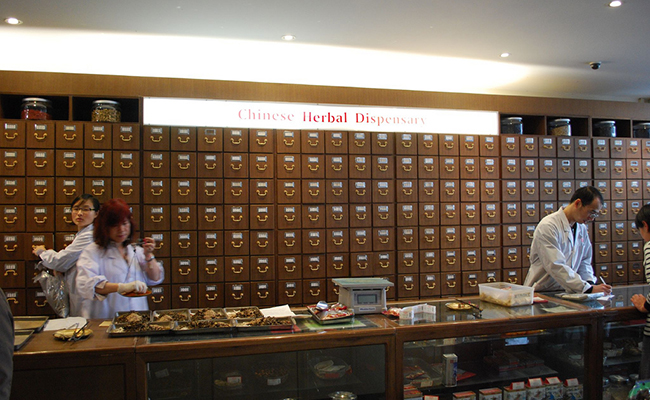Traditional Chinese medicine flourishes abroad

Beijing Tongrentang Group Corporation has opened more than 100 overseas stores. Its Chinese medicine dispensary has gone global.
Traditional medicine has a long history in China, which took shape during the Spring, Autumn and Warring States periods on the theoretical foundation of yin and yang and the five elements. In history, the cultural seeds of traditional Chinese medicine have been successfully carried with Chinese people across the sea and developed roots in foreign countries. But for quite a long time, traditional Chinese medicine was only common among overseas Chinese people.
In recent years, traditional Chinese medicine has hinged on domestic development, comparative advantage and overseas teaching, receiving more and more foreign countries’ recognition. Traditional Chinese medicine has been applied in more than 160 countries and regions with varying degrees, and 4 billion people use Chinese herbal medicine all over the world.
Southeast Asia: solid basis
With geographic proximity to China and support of local Chinese people, traditional Chinese medicine earned a reputation early in Southeast Asia. A number of hospitals and clinics of traditional Chinese medicine have been established in Southeast Asia, and professional qualifications have gradually become systematic and normalized. In 2000, the government of Thailand announced the legalization of traditional Chinese medicine in Thailand and laid the legal basis for two countries’ exchanges and cooperation in the field of traditional Chinese medicine. In the following years, fruitful medical results have been achieved between the two countries.
Africa: initial acceptance
Due to reasonable prices and effective treatment, traditional Chinese medicine has gradually taken root in Africa, and African people have gained a better understanding toward traditional Chinese medicine in recent years. Some local people have even become interested in traditional Chinese medicine and received professional training. In Ghana, medical resources are relatively deficient and the low level of medicine cannot satisfy local demand. With the introduction of traditional Chinese medicine, general patients who cannot afford expensive Western medicine can buy relatively cheaper Chinese herbal medicine.
In 2012, the first largest-scale traditional Chinese medicine forum kicked off in the University of the Western Cape in South Africa. More than 200 Chinese and African experts and scholars participated in the forum and exchanged ideas.
The US: breakthroughs
In the past, traditional Chinese medicine met many difficulties and limitations in the United States. But in recent years, it has broken through legal limitations and improved its reputation. In the United States, 48 states recognize the legal status of traditional Chinese medicine and acupuncture. An investigation reveals that one over ten adults has received the traditional treatment of acupuncture. Even the American army hired acupuncturists to help soldiers to alleviate pain.
